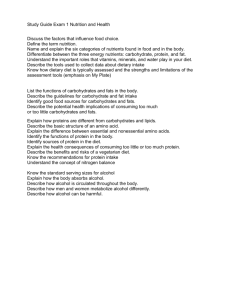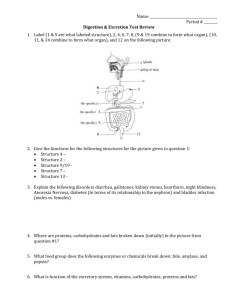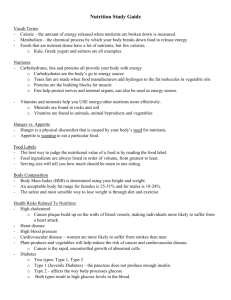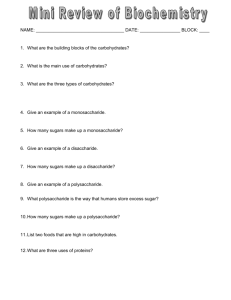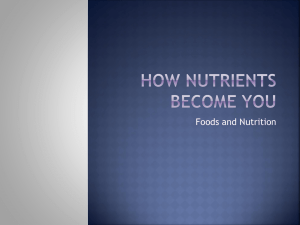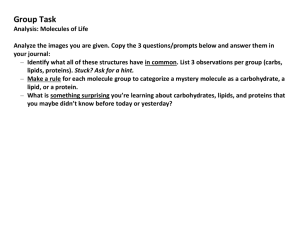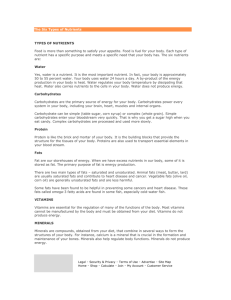Nutrient Reading
advertisement
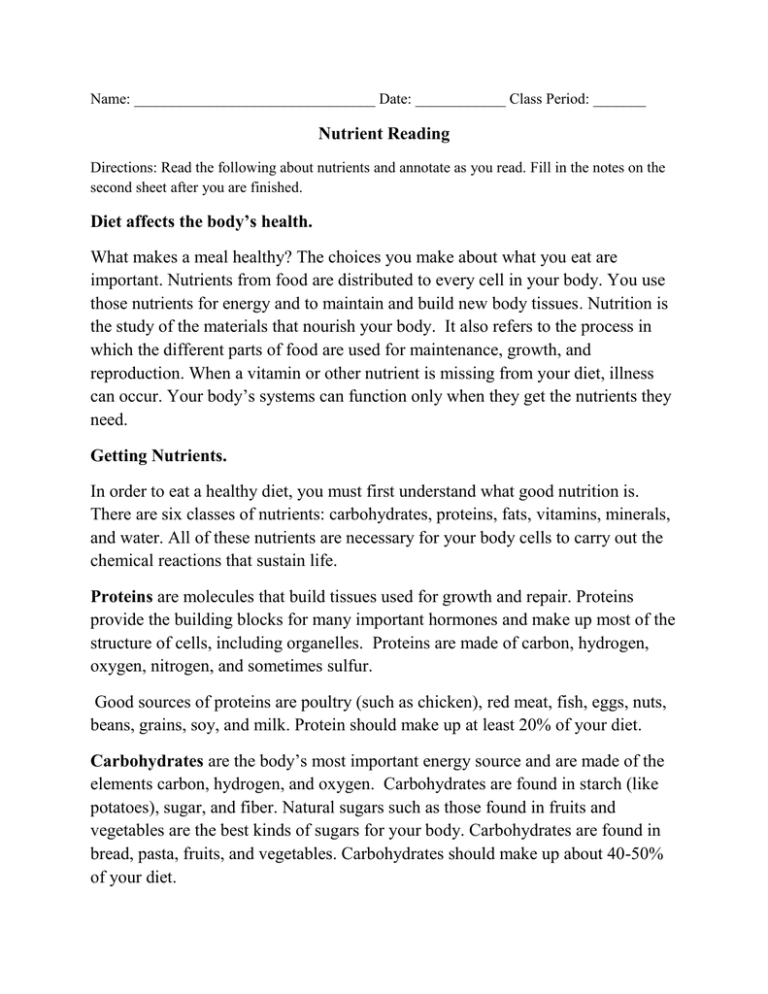
Name: ________________________________ Date: ____________ Class Period: _______ Nutrient Reading Directions: Read the following about nutrients and annotate as you read. Fill in the notes on the second sheet after you are finished. Diet affects the body’s health. What makes a meal healthy? The choices you make about what you eat are important. Nutrients from food are distributed to every cell in your body. You use those nutrients for energy and to maintain and build new body tissues. Nutrition is the study of the materials that nourish your body. It also refers to the process in which the different parts of food are used for maintenance, growth, and reproduction. When a vitamin or other nutrient is missing from your diet, illness can occur. Your body’s systems can function only when they get the nutrients they need. Getting Nutrients. In order to eat a healthy diet, you must first understand what good nutrition is. There are six classes of nutrients: carbohydrates, proteins, fats, vitamins, minerals, and water. All of these nutrients are necessary for your body cells to carry out the chemical reactions that sustain life. Proteins are molecules that build tissues used for growth and repair. Proteins provide the building blocks for many important hormones and make up most of the structure of cells, including organelles. Proteins are made of carbon, hydrogen, oxygen, nitrogen, and sometimes sulfur. Good sources of proteins are poultry (such as chicken), red meat, fish, eggs, nuts, beans, grains, soy, and milk. Protein should make up at least 20% of your diet. Carbohydrates are the body’s most important energy source and are made of the elements carbon, hydrogen, and oxygen. Carbohydrates are found in starch (like potatoes), sugar, and fiber. Natural sugars such as those found in fruits and vegetables are the best kinds of sugars for your body. Carbohydrates are found in bread, pasta, fruits, and vegetables. Carbohydrates should make up about 40-50% of your diet. The energy that is in the bonds between atoms that makes up carbohydrates give off a lot of energy (ATP). Some carbohydrates are better than others. Complex carbohydrates have a lot of natural fiber to keep them from turning into sugars too quickly. Other carbohydrates, like candy, cookies, potato chips, etc. quickly turn to sugars. This is a problem because if the energy from these sugars is not used by the body right away, the ATP (energy) will end up converting to fat to be used later. Fats are essential for energy and should account for about 10 to 15 percent of your diet. Fats are also called lipids, and are made of the elements carbon, hydrogen, and oxygen. They are energy rich and contain even more energy than carbohydrates. Cells store energy in lipids for later use. Fats have twice the amount of energy as carbohydrates, but unfortunately you need to use twice as much energy to burn off a pound of excess fat. Many people eliminate fats from their diet in order to lose weight, but a certain amount of fat is necessary. Fats made from plants have the greatest health benefits. For example, olive oil is better for you than the oil found in butter. Water is necessary for life. A human being could survive for about a month without food, but only about one week without water. Water has several functions. Water helps regulate your body temperature through evaporation when you sweat and breathe. Without water, important materials such as vitamins and other nutrients could not be transported around the body. Water helps your body get rid of the waste products that move through the kidneys and pass out of the body in urine. Water also helps your cells keep their size and shape. It keeps the temperature of cells from changing rapidly. Water helps carry substances into and out of cells. Water is also one of the raw materials used by plants in photosynthesis. To make sure your body can function and maintain itself, you need to drink about eight glasses of water each day. You also get water when you eat food with water in them, such as fresh fruit and vegetables. Name: ______________________________ Date: _____________ Class Period: _______________ Nutrient Notes Type of Nutrient What percent of your diet should it be? What it does for your body Examples Proteins Carbohydrates Fats/Lipids 1. _____________________ form parts of cell membranes and many of the cell’s organelles. 2. Are some carbohydrates healthier than others? ________________ Why?___________________________________________________________________ 3. What happens if you do not use the energy from a carbohydrate? ________________________________________________________________________ ________________________________________________________________________ 4. True or False. Starch is a kind of carbohydrate. _______________ 5. How are lipids like carbohydrates? __________________________________________________________________________ __________________________________________________________________________ __________________________________________________________________________ 6. Cells store ________________in lipids to use later. 7. List two ways your body uses water. a. _______________________________________________________________________ B. _______________________________________________________________________ Selecting Survival Nutrients Your ship has run aground on a small, bare, rocky island, and you are its only survivor. You have only moments to gather supplies from the ship before it breaks up. Since many boats pass by this island, you are confident that you will be rescued in a few days, but want to make sure you have enough nutrition for a month – just in case. Assignment: Select six items from the list below to take with you on the island. Your selections should reflect your knowledge of your nutritional needs to survive one month. You can use your notes and handouts to assist you. List the items in the order of their importance and explain why you chose it in that place. Large barrel of fresh apples 30 cans of beans Box of hotdogs Box of dried fruit Large barrel of water Box of dried biscuits Case of canned tuna fish Large barrel of oranges Desalinating water pump (device that removes salt from salt water) Knife and fishing tackle Box of candy bard Barrel of potatoes Tub of solid vegetable shortening Case of tofu _____________________________________________________________________________ _____________________________________________________________________________ _____________________________________________________________________________ _____________________________________________________________________________ _____________________________________________________________________________ _____________________________________________________________________________ _____________________________________________________________________________ _____________________________________________________________________________ _____________________________________________________________________________ _____________________________________________________________________________ _____________________________________________________________________________ ____________________________________________________________________________
